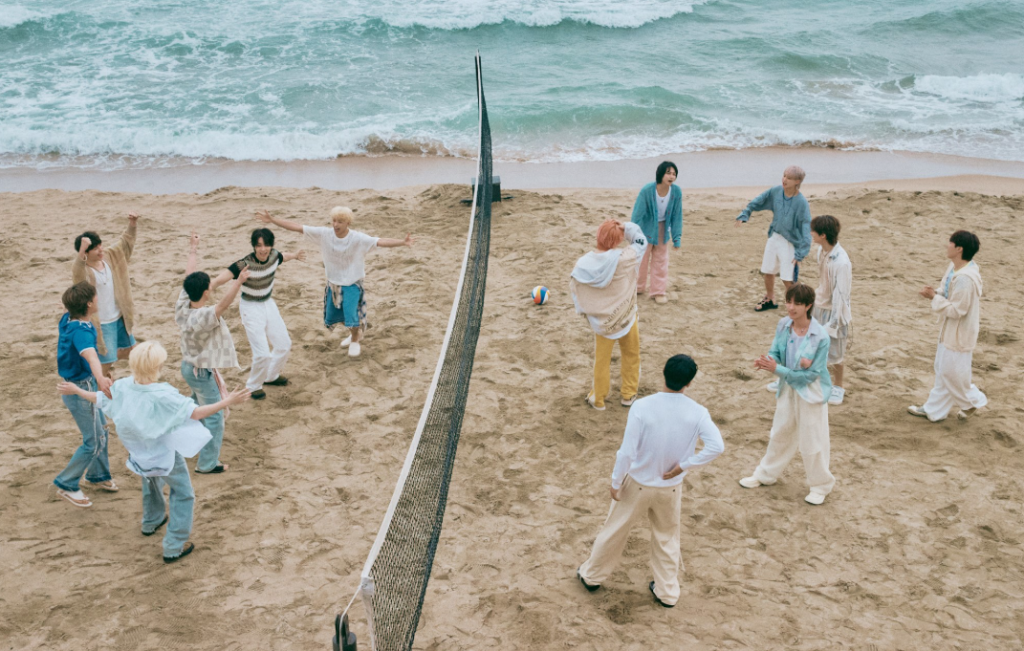When a Korean boy band teams up with music genius Pharrell Williams, what do you get? SEVENTEEN’s latest single “Bad Influence” answers that question perfectly: imagine 13 sharp-dressed guys decked out in Blade Runner-style jackets, running through dystopian architectural ruins while being chased by robot dogs—all while staying effortlessly cool and on beat.
Their music video feels less like a typical K-pop production and more like a perfectly timed cyberpunk short film. Directed by Beomjin, it’s clear that the video isn’t designed for you to just listen to the lyrics—it’s a virtual reality playground where the members become avatars navigating a retro-futuristic maze, with viewers invited to get lost in the details. Watching it feels like experiencing a mash-up of Black Mirror and Blade Runner 2049—confusing, compelling, and impossible to look away from.
You might think all those gadgets and concepts sound like typical music video tropes, but what really hooks you is how SEVENTEEN plays “having fun” in an almost uncharacteristic way for idols. No big smiles, no flashy choreography, no standard fan service. Instead, they come across as youthful captives in a mysterious lab, singing Pharrell’s quietly persistent line: “I used to have time to think about it, but life’s better without it…”
If that sounds a little like your friend running a vinyl record store in Brooklyn, obsessing over synthesizers and dusty black LPs while searching for life’s meaning, that’s exactly the vibe. They remind you of the kind of people who keep an old dot matrix printer quietly humming in a corner of their apartment, just for the nostalgia.
That “retro-futuristic” aesthetic has a charm all its own. Lately, LA’s indie scene has been embracing the imperfect beauty of old tech—CRT screens, VHS tapes, vintage televisions—bringing them back into mainstream art. There’s something magnetic about how these “outdated” devices suddenly feel more personal and real than today’s flawless digital perfection. Watch those AI-generated videos too long, and you realize they lack the quirks and grain that make visuals truly engaging.
That’s why “Bad Influence” feels intoxicating. It’s not just a song; it’s a surreal scene you might’ve dreamed up yourself—pulled from some half-remembered childhood memory or sci-fi film. For example, there’s a haunting shot of the members ghost-riding classic muscle cars through red fog—like a live-action GTA 1985. No flashy CGI, no exposition, just a floating moment that transports you across time and space.
Then there’s the creepy room filled with blindfolded white mannequin heads, the lyrics slowly printing out line by line from a dot matrix printer, the endless Escher-style staircase looping into nothingness—these symbols feel like a nod to MC Escher, Philip K. Dick, and David Lynch. Their works aren’t about straightforward storytelling but about hidden logic in chaos—a vibe SEVENTEEN captures perfectly with this video’s dreamy depiction of youth caught in a system glitch.
Pharrell’s involvement is like the moral compass in this beautiful mess. Ever since his N.E.R.D days, he’s been packaging happiness as a bittersweet release, and here, “Happy” takes the form of an internal struggle. His electronic beats carry a lingering tension—pleasure isn’t freely given but something you grasp while running away from something else.

Maybe that’s why none of the members really smile in the video. Their “fun” is experimental, like testing the reliability of a “joy simulator.” Every step, every sprint, every escape feels like a question to the universe: Can we really be happy this time? Should we try again?
When one member marks “Bad” on the list of emotions alongside “Lost,” “Sad,” and “Innocent,” you can’t help but smile knowingly. It’s not just a theatrical move—it’s a smart self-awareness: Yes, we look conceptual, but deep down, we just want to chill for a bit.
HAPPY BURSTDAY, their new album, debuted at number two on the Billboard 200, cementing SEVENTEEN’s place among K-pop’s global heavyweights. In a time when pop music is increasingly polished and algorithm-driven, their “Bad Influence” feels like a rebellious detour. They don’t give you clear directions or tidy explanations, just a beautifully chaotic visual bomb dropped at midnight, inviting you to watch again and again, hunting for meaning.
It’s like that one friend of yours who stares blankly at the London Tube map at 3:30 AM and suddenly decides, “Yeah, I’m going to get a scuba diving license tomorrow.” Why? “I don’t know, I just feel like it.”
SEVENTEEN’s latest offering? That same kind of impulsive joy.
